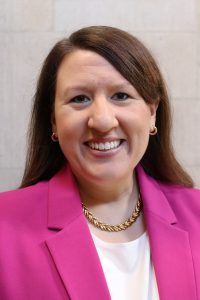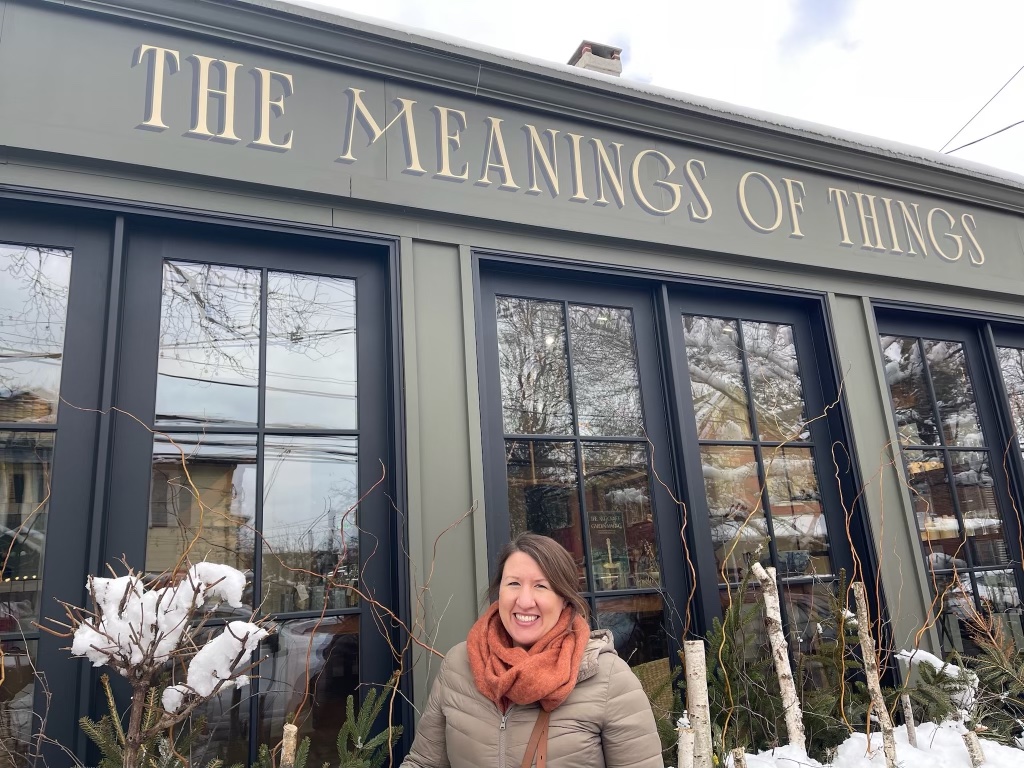Andrea Wood joined Duke this September as Associate Director of Development for Duke University Libraries and Duke University Press. She previously served as Associate Director of Fellowships at Equal Justice Works, a nonprofit in Washington, D.C. that runs the nation’s largest postgraduate legal fellowship program, placing early-career public interest lawyers at nonprofits to address pressing access to justice issues.
Andrea received her B.A. from Davidson College and her J.D. from Emory University School of Law. Outside of work, she enjoys pursuing her interests in oral history and restorative justice, exploring local bookstores and coffee shops, spending time outside, and planning her next travel adventure.
Welcome to Duke! Tell us a little about what drew you to this role.

My background is in nonprofits, development, and law, but I have always had a deep and abiding love for books and libraries. I have wonderful early memories of walking with my grandparents to the public library and checking out a stack of books bigger than I could carry back! This started me on the path to becoming an avid library user in both my personal and academic life. Even when I travel, I try to visit a library if I can in addition to seeking out local bookstores.
Despite how central books and libraries have always been for me, I had never really contemplated the possibility of working with libraries as part of my career. When I saw this opportunity, it really ignited my imagination about the possibility of using my background and skills in service of libraries and an academic press. I went to Davidson for college and had long thought I’d like to return to North Carolina. In particular, the Research Triangle has always seemed like such a vibrant place to me. And as I learned more about the role through the interview process, I got more and more excited by the alignment with my own interests and seeing how I could contribute to the work. I was thrilled when the door opened to join the team here.
Over the last few weeks and months, you’ve been getting to know your new campus community, attending events, and learning more about initiatives currently underway here in the Libraries and at Duke Press. As a Duke newbie, what have been some of the more interesting discoveries you’ve made so far?
It has definitely been a period full of learning and activity in these first two months! My position is unique in having the opportunity to work with both the Libraries and the Press, and I’ve loved learning more about the critical work and impact of each. I’ve been so impressed by the rich collections in the Libraries and all the ways that our expert staff support students, faculty, researchers, and other users, as well as the Duke Press’s critical publications that advance emerging fields of scholarship and help make scholarly research widely available.
It’s been an exciting time to start a new job at Duke, coinciding with the beginning of the new semester. There’s so much energy on campus and lots of activities happening every day, including rich programming in the Libraries and in connection with the Press. As someone committed to lifelong learning, it is exhilarating to have so many ways to plug in. For example, I attended an artist talk here in the Libraries with the photographer Kris Graves, whose work was on display in one of our exhibit galleries. It was fascinating to hear him speak about his artistic trajectory and some of the work he’s done documenting shifts in public opinion about Confederate monuments in the South. I’ve also enjoyed participating in events jointly sponsored by the Libraries and Press, like our book talk with Coach K and the sportswriter John Feinstein during Duke Family Weekend to promote Five Banners: Inside the Duke Basketball Dynasty, which Duke Press just published this fall.
It’s been a couple of months since you moved from D.C. to Durham. Looking back, what have been some of the best parts of the transition?
I am really enjoying living in and getting to know Durham! I had passed through the area and visited campus on a number of occasions in the past, and I had a feeling it was a place I was going to love.
Coming from D.C., I hoped to find a place to live with some walkability, and I feel lucky to have found that. I’ve been impressed by Durham’s compactness and at the same time, how much is going on. There are so many events, incredible restaurants, and vibrant community groups, and I’m already a huge fan of the Durham Farmers Market! I don’t live far from the downtown public library, which is a great resource. I’m eager to continue to get to know and really plug into the community here.
It’s also been great coming to campus every week. The architecture and grounds, including the Gardens, are just beautiful. It’s an inspiring place call your “office.” The Libraries get such robust use, even from the very beginning of the semester, and it’s energizing to see the number of students who use and appreciate the great spaces in the Libraries.

Your come to us with extensive fundraising experience, but also a professional background as a lawyer with a passion for social justice. Can you talk a little bit about how that background dovetails with your interest in libraries, and how it prepared you for the work we do here?
I’ve spent much of my career in roles that focus on relationship building and development efforts in service of mission-driven work, and I feel fortunate to have worked on issues that are important to me from a legal and justice perspective. There are a lot of intersection points with my own interests and the Libraries’ collections, as well as recognizing the important role of libraries and archives. Just to give you one example, I’ve been fascinated to learn how the John Hope Franklin Research Center in the Rubenstein Library is collaborating with contemporary activists and grassroots organizations through the Movement History Initiative. As repositories, libraries can be places to preserve and confront our histories—and also help inform the charting of our future path as a society. Likewise, the Duke University Press is known for being at the forefront of helping shape emergent, interdisciplinary fields that facilitate thinking about the world in new ways and supporting scholars in learning, teaching, and effecting positive change in the world. I’m excited to be part of this important work happening at Duke!
What motivated you to pursue a career in development work to begin with?
There are many issues about which I care deeply, and doing development work has allowed me to be involved in and help support a diversity of efforts, beyond what I’d be able to individually work on. I consider myself somewhat of a generalist, and I’ve always appreciated the role that fundraising plays in lifting up the work of people who are experts and specialists in their fields.
I also highly value collaboration and the relational aspect of what we do—building relationships with people, really getting to know them and what they care about, and working with them to help achieve their desired impact. Identifying and making those connections is a really rewarding part of the work.
I think that’s what initially drew me into development work right after college and kept me involved in a volunteer capacity when I was practicing law. Even when it wasn’t my job, it’s something that I’ve always found to be important and now I love doing it full-time!
It’s often said you can’t have a great university without a great library. But we would be merely good without the generosity of many individuals who believe in our mission and want to support us. What are your thoughts on the importance of philanthropy to our work?
It’s absolutely critical. Duke’s libraries are world-class in their offerings and what they’re able to provide students and faculty as part of their experience here, as well as researchers and the community more broadly. I don’t think that kind of impact would be possible without philanthropic support and the many, many people who have supported the Libraries so generously. It’s hard to overstate the value of donors to our vision and goals for where we want to be. We wouldn’t be able to get there without the partners who are walking alongside the Libraries to move us forward.
Last question. Because we work in a library, I have to ask: What’s the best thing you’ve read lately?
This is such a hard question! I’m not sure I can narrow it down to one book, so I’ll give you two. I recently read Hua Hsu’s memoir Stay True, which I found to be a really moving and powerful reflection on friendship, family and identity that focused on Hsu’s years in college and the impact of a tragic loss.
Although I generally read more fiction, I’d also highlight another nonfiction book that I recently revisited—Say Nothing by Patrick Radden Keefe, which looks at Northern Ireland during the period of the Troubles through the prism of one woman’s abduction and murder. I’m particularly drawn to these topics, having had the chance to study in Ireland for a semester during law school and participating in a conflict management training program in Northern Ireland earlier this year. Keefe’s work also shone a light on some of the complexities around the collection and use of oral histories (a significant interest of mine!) from periods of conflict and violence.
I’ll stop myself there for now but look forward to many more opportunities to discuss great books!

